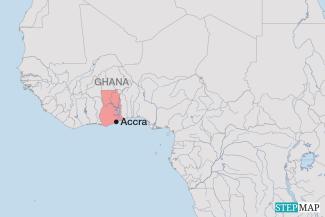Ecological change
Ghana introduces emissions tax

Law makers argue that the policy will reduce the carbon footprint and mitigate the negative effects of pollution on public health and the environment. Some economists disagree with the strategy. Under the new law, businesses and individuals will be required to pay taxes based on the volume of emissions they generate. It is hoped that it will encourage Ghanaians to consider using cleaner and more sustainable energy sources.
Motorised traffic has greatly increased in the country. Most vehicles imported from overseas are refurbished and predominantly use petrol and diesel with great air pollution capabilities. In 2022, 72 % of the 3.2 million cars registered in Ghana were powered by petrol, 27 % by diesel, according to the Driver Vehicle and Licensing Authority (DVLA).
DVLA’s Kwasi Agyeman Busia expressed concern: “Our vehicle population is increasing, and this means that emissions are also going up. It is a nightmare to be behind cars that have dark fumes coming out of the exhaust pipe. It is harmful to the environment and injurious to health.”
The country has also moved to encourage importation of electronic vehicles. In February 2024, the parliament passed a law to exempt import taxes on electric public transport vehicles for eight years.
However, there has been opposition to the new emissions tax from civic and consumer groups who view it as an additional financial burden, especially given the persistent rise in fuel prices, interest rates, inflation and constant depreciation of the local currency. Critics argue that the tax will increase production costs for industries, leading to higher prices for consumers and putting additional strain on their budgets. Small and medium-sized enterprises may also struggle with rising costs and may not be able to afford cleaner technologies and processes.
Some experts question the timing and approach of the tax, pointing out that a similar tax policy introduced in the past did not yield positive results. They also raise concerns about the lack of alternatives to the tax and the current infrastructure to support the adoption of electric vehicles.
Theophilus Acheampong, an economist and political risk analyst at the University of Aberdeen objects to the levy stating that “it amounts to double taxation and there is no clear plan for how the tax revenue will be used”. He emphasises the importance of aligning environmental tax instruments to achieve environmental goals, incentivise behavioural changes and replace existing taxes with vehicle emissions tax.
Ghana faces a policy challenge in finding a balance between protecting the environment and maintaining economic stability, particularly due to the underdeveloped public transport infrastructure in Accra, which contributes to high levels of pollution.
Dasmani Laary is a journalist in Ghana.
laarygna@gmail.com














